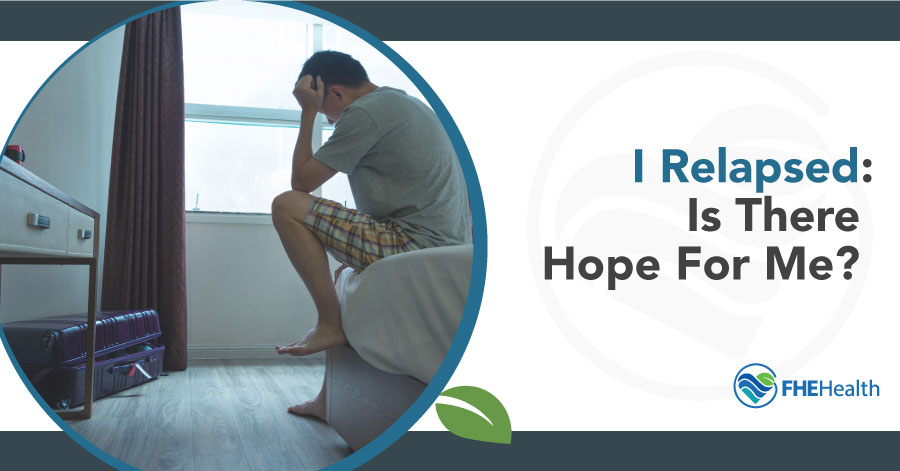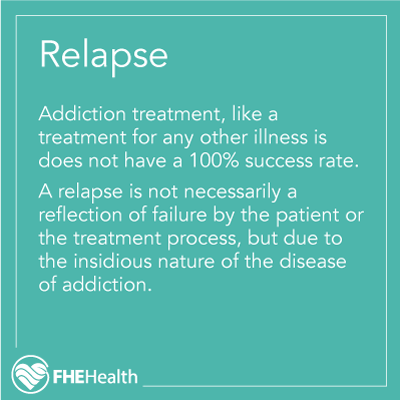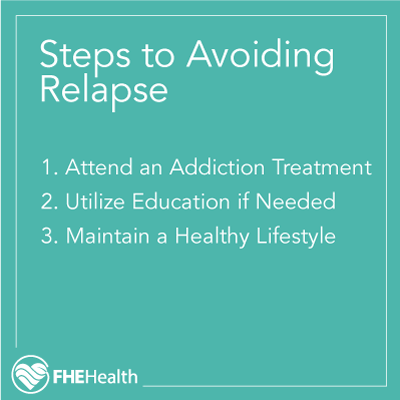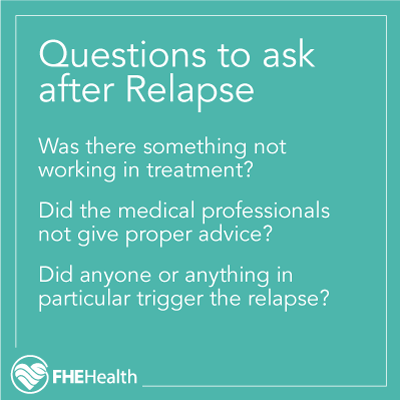
Human beings all make mistakes. Individuals trying to quit an addiction can sometimes feel bad and begin abusing again. This return to their old habits is called relapse, and while there are techniques for relapse prevention, sobriety can still be achieved even after relapse with the right support and proper treatment.
What Is Relapse?
 Rehabilitation is not always one hundred percent effective. It is a highly personal experience that recovering addicts respond to differently. Some may need weeks for recovery, others years. Treatment is impacted greatly by the substance that was abused, how long it was used for, and the impact it had on the mental and physical health of the individual. Considering all of these factors, it is important not to judge anyone’s pursuit of sobriety and the path they take to get there.
Rehabilitation is not always one hundred percent effective. It is a highly personal experience that recovering addicts respond to differently. Some may need weeks for recovery, others years. Treatment is impacted greatly by the substance that was abused, how long it was used for, and the impact it had on the mental and physical health of the individual. Considering all of these factors, it is important not to judge anyone’s pursuit of sobriety and the path they take to get there.
People trying to quit using drugs or alcohol are incredibly vulnerable. They often face long withdrawal periods where their bodies yearn for the high created by the substance. This process usually is painful and involves intense cravings. A person going through this may start feeling weak or depressed and so they fall back on substances again. This is known as relapse.
Relapse is normal, common, and happens frequently during the rehabilitation journey. Sometimes it only takes place once, other times there can be multiple reoccurrences. Relapse prevention takes a while for someone who has become dependent on a substance as they must learn to live life without it. But no matter how relapse takes shape, one must always go back into treatment as quickly as possible due to the potentially deadly consequences of substance addiction.
Relapse Is More Common Than You Think
Imagine you made it through a rehab program for alcoholism. You’re going to AA meetings. You have a counselor you see occasionally to check in on your recovery. You’re feeling better than you have in years. So when an old friend comes into town and invites you to one of your favorite old hangout spots, you think, “What’s the worst that can happen?”
You’re sitting in a bar with friends you haven’t seen in a long time, and everyone is laughing and reminiscing about old times. They say, “Come on, have a drink with us,” and you think about the good place you’re in and how you have your problem under control. One drink can’t hurt.
But one drink turns into many drinks, and when you wake up in the morning, reality washes over you. It can feel like you ruined everything you worked so hard for, and now you’ll have to return to the very beginning and restart the process. Faced with this prospect, you might think it’s easier to just drink away the pain.
But an understanding of relapse — including how easy it is to slip into — can help you resist wasting all the hours you’ve spent working on yourself.
So You Relapsed… Now What?
People who relapse often feel like failures, but it’s important to remember you’re not alone. Here are some things you can do to help yourself after relapse.
Reach Out for Help
If you’re in a 12-step group, contact your sponsor or attend a meeting as soon as possible. Come clean to the people closest to you that you can trust to help you get back on your feet.
Avoid Temptation
Your emotional state is extremely fragile after relapse occurs, which means you may not be able to resist triggers the way you did when you got clean the first time. Don’t attend events where alcohol or drugs will be present. Don’t leave yourself alone with easy access to substances.
Consider Professional Assistance
There’s no shame in entering rehab after a relapse, despite your feeling that everyone will look at you as someone who failed. People know how easy it is to slip, and to return to a treatment program to get back on your feet is a commendable step to take.
Relapse Intervention at FHE Health
Immediately following a relapse is one of the most important times to take action. If you let yourself wallow in self-pity or continue to use, you may be undoing more of the work it took to get to this point. At FHE Health, we’re called upon often in times of crisis by people who recently relapsed because they trust us to provide high-quality treatment as efficiently as possible.
Relapse Prevention
Relapse prevention is challenging and involves learning how to live without what was once a critical aspect of daily life. One must relearn how to do things sober. Clearly, there will be trial and error, but success is still entirely achievable. Here are some ways to curb relapse:
 Attend an Addiction Treatment program: FHE Health has detox centers for both drug and alcohol addiction. They are medically assisted, giving patients access to therapists, nurses, and doctors there to provide twenty-four-hour care. Detoxing is the process of ridding the body of harmful chemicals and so the programs last for around a week since that is the time it takes for withdrawal symptoms to wear down. The periods of withdrawal and substance cravings are the most likely time where a person in recovery will return to using. Spending this critical interval under constant supervision will allow for a user to leave having overcome the worst of itching for drugs and alcohol, making relapse far less likely. It is the best first step you can take when you begin living your new life.
Attend an Addiction Treatment program: FHE Health has detox centers for both drug and alcohol addiction. They are medically assisted, giving patients access to therapists, nurses, and doctors there to provide twenty-four-hour care. Detoxing is the process of ridding the body of harmful chemicals and so the programs last for around a week since that is the time it takes for withdrawal symptoms to wear down. The periods of withdrawal and substance cravings are the most likely time where a person in recovery will return to using. Spending this critical interval under constant supervision will allow for a user to leave having overcome the worst of itching for drugs and alcohol, making relapse far less likely. It is the best first step you can take when you begin living your new life.- Utilize medication if needed: The more intense withdrawal is, the chance for relapse is greater as the addict is seeking relief. However, there are medications available that drastically reduces cravings. There is no reason to feel ashamed for needing pills for relapse prevention as they are becoming widespread and successful in the treatment of opioid addiction, particularly with heroin. Lofexidine is a non-opioid medication approved by the Food and Drug Administration to ease discomfort. Naltrexone is non-addictive and completely cuts off receptors in the brain, blocking the effects of opioids. Upon consuming any type of opioid, the pain, addiction, and pleasure centers of the brain will not register the drug. This makes the recovering addict uninterested in the drug and prevents relapse since the opioid receptors have been capped. Methadone and buprenorphine are used for pain management since they bind to the same receptors in the brain as heroin. They are much weaker and do not create strong cravings, so there can be a gradual weaning off of the drug.
- Maintain a healthy lifestyle: Living sober does not just mean doing so without drugs and alcohol. It also involves adopting healthy behaviors in daily, a strategy immensely useful when it comes to relapse prevention. Nutrition and diet are a means of going about this as certain foods and drinks trigger strong, positive memories capable of masking negativity and alleviating depression. They can take the mind off of substances. In addition, a structured diet can give a sense of order and control that drugs strip away. Foods particularly high in vitamins and proteins boost proper cognitive functioning, permitting the brain to work without drugs and alcohol and reduce drug cravings. If products are too expensive or not easily accessible, supplements can substitute them. Hydration is also key to a healthy lifestyle since addicts frequently mistake thirst for drug cravings. Water is essential to detoxing the body as it flushes harmful toxins out through urination, perspiration, and bowel movements.
Exercise and sleep are two more features of clean living. Exercise triggers the release of endorphins and having this firing of neurotransmitters naturally makes for a lesser chance of relapse as drugs are not needed to produce that high. Physical activity not only restores the brain’s chemical balance but encourages healthier eating, more consumption of water, and better sleep. Sleep helps addicts cope with changes in their mood and drug cravings that occur with withdrawal and lead to them missing the substance. In many cases, drugs and alcohol ruin sleep schedules, causing restlessness and insomnia. Many people start abusing in the first place to deal with sleep issues. As many as 20% of Americans use alcohol to induce sleep as it causes drowsiness. Learning how to manage rest patterns will make it less likely that a user going through treatment will reuse substances to help them sleep easier.
Hope After Relapse
 While there are many methods to ensure relapse prevention, relapse is still common. In fact, the rate of relapse for patients who have finished a treatment program is almost equal to that of people who had previous medical care for afflictions such as asthma, Type 1 and hypertension.
While there are many methods to ensure relapse prevention, relapse is still common. In fact, the rate of relapse for patients who have finished a treatment program is almost equal to that of people who had previous medical care for afflictions such as asthma, Type 1 and hypertension.
It is important that no matter how many times a user relapses, he or she needs to return to therapy to continue treatment. Learning to control triggers one associates with substance addiction is a process that takes many years to master with repeated assistance. Having that in one’s arsenal makes it much easier to resist cravings and ignore the desire to relapse over time.
Treatment must be sustained because relapse can be deadly with certain substances. When someone tries to quit a drug, their body loses tolerance, and so reusing can cause an overdose due to the body being in a weakened state. Avoiding this requires constant supervision and counsel that can only be provided in a treatment program.
In regards to relapse prevention, the National Institute of Drug Abuse has said: “Treatment of chronic diseases involves changing deeply rooted behaviors, and relapse doesn’t mean treatment has failed. When a person recovering from an addiction relapse, it indicates that the person needs to speak with their doctor to resume treatment, modify it, or try another treatment.”
There is hope after relapse, it is not the end. The first thing to do is accept that it happened and take responsibility. Feeling guilty and punishing oneself in unnecessary. Taking responsibility is understanding what led to the relapse happening. Was there something not working in treatment? Did the medical professionals not give proper advice? Did anyone or anything in particular trigger the relapse? After all of that, the most important thing to do is construct a plan on how to forge ahead in a positive and refreshed mindset. Consistent and regular treatment is the best way to avoid another slip-up. Relapse prevention therapy exists for the sole person of giving recovering users the tools needed to remain sober. Joining a support group with other people in treatment will show the breadth of recovery stories. Seeing how others have relapsed and come out better is a great lesson on not putting too much pressure for having reused in a moment of vulnerability.
Contact Florida House
If you or someone you know has relapsed and needs treatment, contact us at 833-596-3502 for assistance on how to reach out to them or get help for yourself. Our team of highly trained and compassionate medical specialists, counselors, and addiction experts can assist you with relapse prevention. There is always hope when it comes to recovery and it is never too late to seek help.






